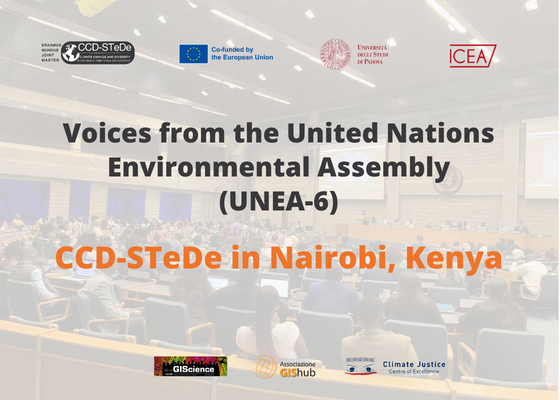On February 17h, the sixth edition of the United Nations Environmental Assembly (UNEA-6) commenced at the headquarters of the United Nations Environmental Program (UNEP) in Nairobi, Kenya. This biennial event focuses on the topics of “effective, inclusive, and sustainable multilateral actions to tackle the triple planetary crisis of climate change, nature and biodiversity loss, and pollution and waste.”
Our collaborator from the international research group “Climate Change, Territories, and Diversity,” Dr. Carlo Zanetti (PhD candidate in Human Rights at the University of Padua), is an observer for the EV-K2-CNR committee, which addresses meteorology and climatology in mountain environments.
Associated events with UNEA encompass a variety of activities. The Youth Environmental Assembly, held between February 17th and 18th, brought together over 400 young people aged 18 to 35 from around the world. The assembly featured self-training sessions with world-renowned experts on conference themes, as well as plenary sessions to discuss proposed amendments to draft resolutions presented by member states. At the end of the assembly, the youth declaration on the environment was delivered into the hands of Inger Andersen, Executive Director of UNEP.
From February 19th to 23rd, the sixth Open-ended Committee of Permanent Representatives (OECPR) convened as the intersessional subsidiary body of UNEA. The 6th OECPR served as a preparatory meeting for the UNEA-6 agenda, where experts from member state delegations negotiated resolutions, declarations, and decisions for approval by the Assembly.
Prior to UNEA-6, the Global Major Groups and Stakeholders Forum (GMGSF) occurred over the weekend of February 24th to 25th, organized by major groups and stakeholders with secretariat assistance. The Forum aimed to prepare contributions from major groups and stakeholders for the Environment Assembly, focusing on draft resolutions and decisions submitted by member states.
The UNEA, taking place from February 26th to March 1st, 2024, serves as the world’s highest-level decision-making body for environmental matters. It establishes priorities for global environmental policies and international environmental law, aligning with the 2030 Agenda for Sustainable Development.
Over the five-day UNEA, the first three days feature plenaries, national and regional statements, and the work of the Committee of the Whole. The final two days focus on the High-Level Segment, involving participation from heads of state and government.
If you’re interested in UNEA activities and wish to actively participate, you can accredit your organization with UNEP by following the instructions provided here.







